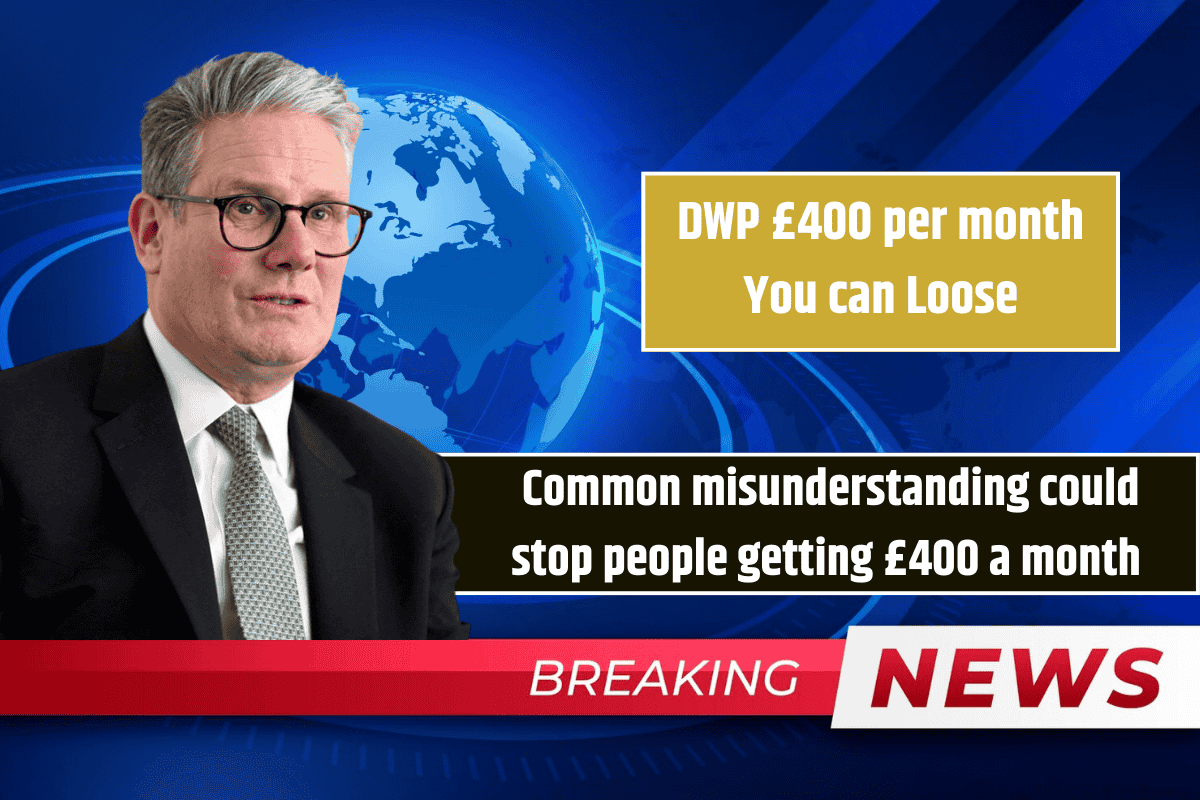DWP £400 per month You can Loose: Common misunderstanding could stop people getting £400 a month
In the UK, thousands of people could be missing out on up to £400 every month in financial support from the Department for Work and Pensions (DWP). The main reason? A simple misunderstanding. Many eligible individuals are either unaware they qualify, or they don’t fully understand how to apply. This means they lose money they could badly use—especially with rising living costs, rent, and energy bills.
This article explains what’s going on, who qualifies, and what you can do to make sure you don’t miss out on this money.
| Topic | Details |
|---|---|
| Scheme Name | DWP Benefits and Support |
| Monthly Support Amount | Up to £400 per month |
| Risk | Many people losing out due to confusion |
| Common Issue | Misunderstanding eligibility or process |
| Who It Affects | Low-income individuals and families |
| Action Needed | Check eligibility and apply correctly |
What Is the £400 DWP Support?
The DWP offers a range of benefits to help people who are unemployed, disabled, caring for others, or on low income. Depending on your situation, you could receive up to £400 each month through certain benefits such as:
-
Universal Credit
-
Personal Independence Payment (PIP)
-
Carer’s Allowance
-
Employment and Support Allowance (ESA)
-
Child Tax Credit / Working Tax Credit
The exact amount you receive depends on your circumstances. But the key point is that many people qualify and don’t realise it.
Why People Are Missing Out
The reason so many are missing this support is mainly down to confusion and false assumptions. Here are some common mistakes people make:
-
Assuming They’re Not Eligible Many people think they don’t qualify because they’re working, have savings, or live with someone else. But eligibility rules are more flexible than many believe.
-
Not Knowing What to Apply For Some people aren’t sure which benefit they should claim. The system can be hard to navigate, and not everyone gets clear advice.
-
Scared of Making a Mistake Some people worry that if they apply incorrectly, they’ll get into trouble. This fear can stop them from applying altogether.
-
Not Realising They Can Appeal If someone is turned down, they often give up. But in many cases, a simple appeal or re-application with the right documents can lead to success.
-
Lack of Internet Access or Help Since most applications are online now, people without internet or digital skills find it hard to apply. This especially affects older people.
Who Can Get This Money?
You may qualify for up to £400 per month if:
-
You’re on a low income (even if you’re working)
-
You have a disability or long-term health condition
-
You’re a carer looking after someone else
-
You’re a parent or single parent
-
You’re out of work or working part-time
-
You’re struggling with housing or energy costs
Important: You don’t need to be unemployed to claim. Many working people are entitled to support.
What You Should Do Now
If you think you might be missing out, here’s what you should do:
-
Check Your Eligibility
Use an online benefits calculator or speak to a local adviser. You don’t need to commit to anything yet—just find out what you could get. -
Gather Your Information
Have your income details, household bills, rent info, and health conditions ready. This makes applying easier. -
Make the Application
Go to the official government website or call DWP if you need help. Some charities and councils also offer free advice and help with forms. -
Don’t Be Afraid to Appeal
If your application is rejected, ask why. You might just need to send more evidence. You have a right to appeal. -
Ask for Help
If you’re unsure, talk to a welfare advisor, local council, or support charity. Don’t leave money sitting unclaimed.
FAQs – Frequently Asked Questions
1. I have a part-time job. Can I still get this money?
Yes, many people who work part-time still qualify for support, especially through Universal Credit or Working Tax Credit.
2. What if I applied before and got rejected?
You can always try again. Your situation may have changed, or you may be able to give better information now. Appeals are common and often successful.
3. Do I need to pay this money back?
No, benefits like Universal Credit or PIP are not loans. You don’t need to pay them back unless you were overpaid due to an error.
4. I live with my partner. Can we both claim?
You apply as a household, so your joint income and situation will be looked at. But many couples still qualify for support.
5. What’s the fastest way to apply?
Online is usually the quickest. Go to the .gov.uk website, but make sure you’re on the official page. If that’s difficult, you can also apply by phone or get help from local support centres.
Final Thoughts
Too many people in the UK are losing out on up to £400 a month just because of simple misunderstandings. Don’t assume you’re not eligible. Take a little time to check what’s available to you. Whether you’re working, caring for someone, or facing financial stress—help might be waiting.
In a time where every pound counts, making sure you’re getting what you’re entitled to is not just smart—it’s essential. Don’t let confusion or doubt keep you from support that could make your life a little easier.




